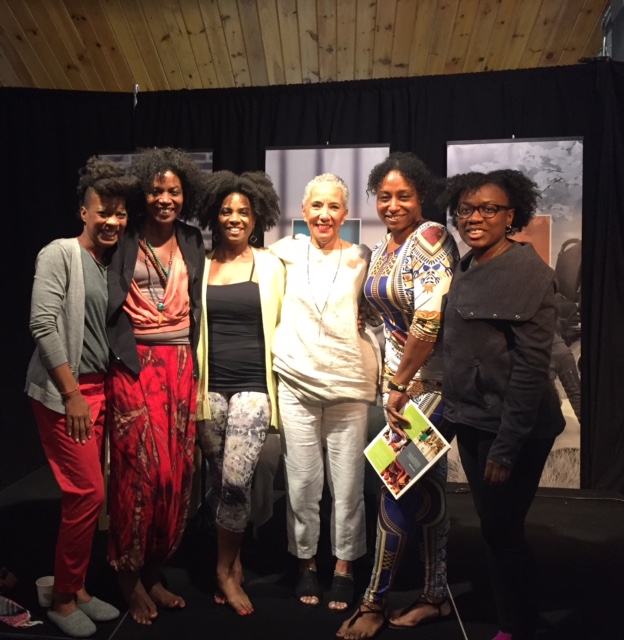Every year in May, the Yoga Service Council brings together yoga practitioners and educators who work in the field service to the Yoga Service Conference at the Omega Institute in Rhinebeck, NY. What brought me to this year’s conference was a desire to develop my teaching practice by participating in a conference that aims to unify the collective efforts of yoga service professionals whose objective often differs from other yoga professionals: to empower and foster community through yoga. Yoga Service is a growing and expanding field that embraces the following the aim: the intentional sharing of yoga practices that support healing and build resilience for all, regardless of circumstances, taught within a context of conscious relationship rooted in self-reflection and self-inquiry. As someone who teaches in the field of yoga and yoga service, though my intention is to teach all my students with the intent to serve, not all yoga is explored through the lens of service. Below are reflections on my experience of this enriching conference and how the contrasting exploration of yoga service cast a clarifying light on some of the more harmful yoga experiences of my past.
Dr. Gail Parker presents at YSC 2017: Don’t Just Do Something, Sit There
Yoga Service Council aims to create spaces where yoga practitioners of all socio-economic backgrounds are welcome.
I received a scholarship to attend this conference. Financial need was not an obstacle for my attendance. I didn’t have to jump through a ton of hoops to get it either. I work in yoga service. I was awarded a scholarship because my presence was desired at the conference and welcomed. Period.
Yoga Service Council acknowledges and explores this fact with rigor: human beings are apt to see only what is familiar, so we must commit to a greater understanding.
The conference gave me ample time to reflect on this beautiful agreement that was formally adopted by the YSC when it was established. Ten years ago, after a lifetime of yoga practice that began in my childhood meditation room, I realized that I was meant to teach yoga. I had spent 10 years prior, floating from one yoga studio to another bringing family and friends to classes that did not embrace them or me. Unlike me, most of them did not return to these studios or classes. It stuns me a bit to have to
acknowledge this, but I had grown accustomed to being ignored by yoga teachers who were uncomfortable with my being there, to being judged for being too new or assumed not trained enough to be in an advanced class, or to being verbally harassed by being repeatedly singled out and highlighted for the doing what everyone else in class was also doing because it looked “different” on my curvy, black body, and for being physically harassed through inappropriate touch in these spaces as a very vulnerable student. In my view, the value of learning yoga trumped my discomfort and the lack of cultural competence that many of my early teachers demonstrated. I loved yoga, and so therefore just endured the subtle but constant invalidation of my existence at whatever cost. Yoga was so important to my wellbeing and my life, that I was willing to make the sacrifice of feeling truly safe with these teachers to get it, no matter the state of the vessel that brought it to me. I can remember being seized by stage fright (and the irony of me also being a professional actor is not lost on me) during the practice teaching segments of my various teacher training experiences. I can also remember having entire thoughts and words snatched from my mind by anxiety due to pressure and a history of feeling like I had to be 10 times better than everyone else just to be seen at all during auditions for some of the most popular Bay Area and New York City studios. Fundamentally, I did not feel safe or that my best interests were in the hearts of my trainers or the studios owners who were there to evaluate me. Somehow under circumstances that had the potential to be warm, welcoming, and supportive of my own integration of self were instead some of the most subtly aggressive learning environments I have ever been in. On the other hand, historically, I am a person who thrives in school. I love learning. And I have been privileged and blessed to learn in some of the most esteemed institutions including Miss Porter’s School, Stanford University and The American Conservatory Theater. So what was going on here? Why did I feel hostility from my yoga teachers, of all people? What was it about these yoga studios and teachers that made me feel so subconsciously and overtly unsafe?
Today, as a yoga teacher and wellness professional to adults and children, my profession requires that I stay up to date with the latest neuroscience research on the developing brain, interpersonal neurobiology, and the effects of trauma and culture on the brain and learning. So now I fully understand the complex intersecting systems of race, class, power, privilege and gender at play during the infamous episodes on my journey to becoming a skilled yoga teacher and teacher trainer. These systems had a hand in undermining my ability to convey while “under a white gaze” all the skill, knowledge and intuitive nuance that I am capable of demonstrating as a teacher. Children don’t learn when they feel invisible or unsafe, and adults don’t either.
While at the Yoga Service Conference, for the first time in 20 years and after attendance at too many alternate yoga conferences to name, I came across a workshop breakout presentation that actually addressed many of my experiences and conclusions about why all yoga teachers should value the teaching tool of developing cultural competence. Cultural competence requires that teachers reflect on what they recognize as familiar, and that teaching students who are different from you requires greater understanding. I experienced YSC putting their money where their mouth is at the Yoga Service
Conference, for sure. I did so during a breakout presentation by Dr. Santiba Campbell and Dr. Tamara Jeffries about their experiences as professors teaching yoga at Bennett College, a historically Black Christian college in Greensboro, NC. The presentation, Best Practices in Cultural Competency: A View from a Historically Black College, opened with warmth and heart. The facilitators met the eyes of each participant, and this alone instantly made me feel safe. My brain thought, they see me, aren’t afraid of me, and they are glad that I am here. My entire body softened into a state of ease because of it. I couldn’t help but compare the feeling Dr. Jeffries and Dr. Campbell created at the conference to the one I share with my own students, particularly those in schools, when the kids literally jump up to greet and hug me and tell me the latest tidbit about their lives when I enter their classroom. The love and connection between them and me is palpable and undeniable. I appreciated Dr. Jeffries and Dr. Campbell intentionally making this connection with participants like myself from the start. Dr. Jeffries went on to offer a breathing practice to ground and unify the group. Their 90 minute presentation included participant contributions and questions throughout, which contributed to the creation of community and ensured “participant-centered learning” as well. To summarize their conclusions about Culturally Competent Yoga Teaching at Bennett: a yoga teacher cannot just walk into a classroom of students and attempt to teach them yoga without taking into account their unique histories, experiences, and social, emotional, gender, cultural, spiritual and religious needs, and an examination of the teacher’s own background and relationship to understanding those student needs. It seems like common sense, I know, but you’d be amazed how often most yoga teachers just project their knowledge and skill set onto their students without seeing them at all, without taking into account any of the needs that brought them to class in the first place. Without recognizing what tremendous resource already exists in student experience as a jumping off point for learning and growth in the area of yoga, a yoga teacher greatly reduces the potential impact that yoga might have on supporting the overall well-being of his/her students. In fact, without seeing, acknowledging, celebrating and connecting with your yoga students, one might argue that your students won’t learn anything lasting or empowering at all. And that is a useless waste of the incredible tool that yoga can be.
Yoga Service Council is full of warm, generous and kind people who talk their yoga talk and walk their yoga walk.
Finally, a big missing in many of the yoga circles I have maneuvered in over the years is that warm and fuzzy feeling that you assume might be present in a yoga community, but often just isn’t there at all. At YSC, I was greeted by people I hadn’t even met yet with hugs. Yes, that’s right, hugs! The best part about these hugs was that I couldn’t help but feel like the best appropriate response in each case was to hug back. One late afternoon before dinner was served, I was hungry but had no cash to buy something at the cafe. I didn’t want to give in to corporate greed and pay $6 in fees from my bank and the ATM machine’s just to get a snack, and someone leapt to my rescue and just gave me $5 with no strings attached. How generous! Finally, at the same breakout session mentioned above, a white woman asked a question that was particularly racially and culturally insensitive and quite triggering to me and many other Black yogis in the room. Without going into the details and making this post another page long, I’ll sum up the pleasant surprise outcome instead: A white yoga ally stepped up privately to connect with her to support her cultural education so that a Black woman like myself, who stopped taking on the exhausting burden of having to educate ignorant white people with heartful intentions (yet who still inflict violent abuse through racial micro-aggressions), and no other Black person would have to. Hallelujah! This may have been the most celebratory takeaway of them all.

